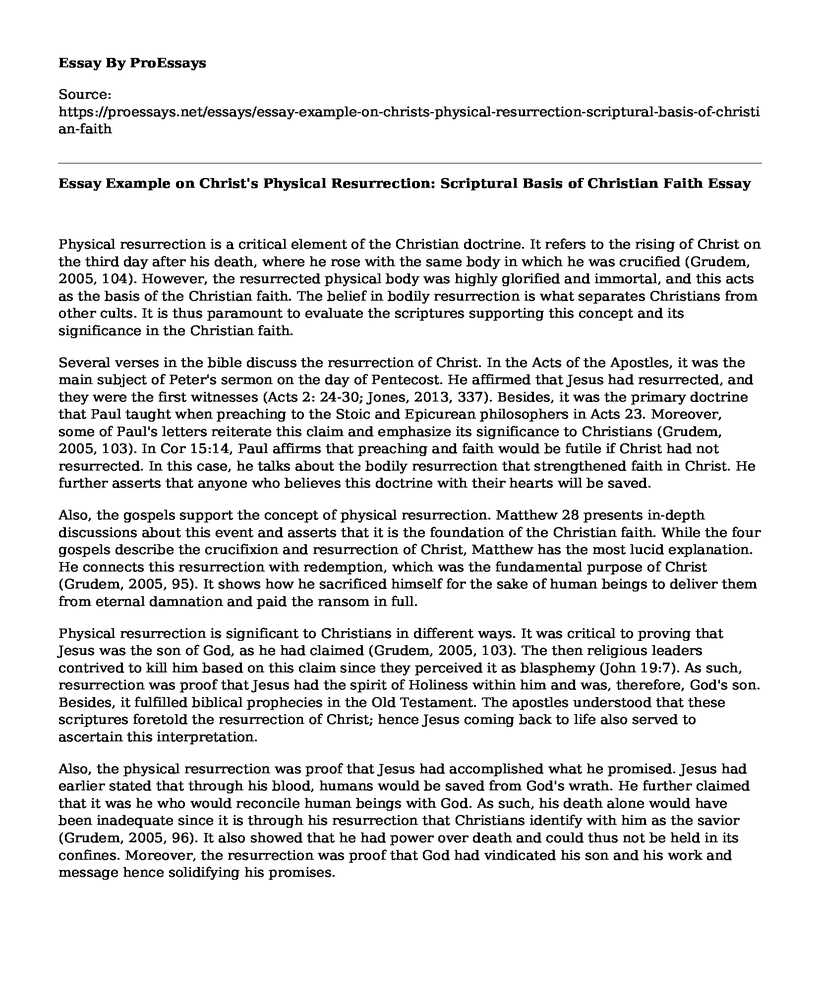Physical resurrection is a critical element of the Christian doctrine. It refers to the rising of Christ on the third day after his death, where he rose with the same body in which he was crucified (Grudem, 2005, 104). However, the resurrected physical body was highly glorified and immortal, and this acts as the basis of the Christian faith. The belief in bodily resurrection is what separates Christians from other cults. It is thus paramount to evaluate the scriptures supporting this concept and its significance in the Christian faith.
Several verses in the bible discuss the resurrection of Christ. In the Acts of the Apostles, it was the main subject of Peter's sermon on the day of Pentecost. He affirmed that Jesus had resurrected, and they were the first witnesses (Acts 2: 24-30; Jones, 2013, 337). Besides, it was the primary doctrine that Paul taught when preaching to the Stoic and Epicurean philosophers in Acts 23. Moreover, some of Paul's letters reiterate this claim and emphasize its significance to Christians (Grudem, 2005, 103). In Cor 15:14, Paul affirms that preaching and faith would be futile if Christ had not resurrected. In this case, he talks about the bodily resurrection that strengthened faith in Christ. He further asserts that anyone who believes this doctrine with their hearts will be saved.
Also, the gospels support the concept of physical resurrection. Matthew 28 presents in-depth discussions about this event and asserts that it is the foundation of the Christian faith. While the four gospels describe the crucifixion and resurrection of Christ, Matthew has the most lucid explanation. He connects this resurrection with redemption, which was the fundamental purpose of Christ (Grudem, 2005, 95). It shows how he sacrificed himself for the sake of human beings to deliver them from eternal damnation and paid the ransom in full.
Physical resurrection is significant to Christians in different ways. It was critical to proving that Jesus was the son of God, as he had claimed (Grudem, 2005, 103). The then religious leaders contrived to kill him based on this claim since they perceived it as blasphemy (John 19:7). As such, resurrection was proof that Jesus had the spirit of Holiness within him and was, therefore, God's son. Besides, it fulfilled biblical prophecies in the Old Testament. The apostles understood that these scriptures foretold the resurrection of Christ; hence Jesus coming back to life also served to ascertain this interpretation.
Also, the physical resurrection was proof that Jesus had accomplished what he promised. Jesus had earlier stated that through his blood, humans would be saved from God's wrath. He further claimed that it was he who would reconcile human beings with God. As such, his death alone would have been inadequate since it is through his resurrection that Christians identify with him as the savior (Grudem, 2005, 96). It also showed that he had power over death and could thus not be held in its confines. Moreover, the resurrection was proof that God had vindicated his son and his work and message hence solidifying his promises.
Conclusion
Overall, it is through death and resurrection of Christ that atonement happened. Jesus took humans' sin, and by his resurrection and conquering death, he gave rise to a new creation (Grudem, 2005, 95). Thus, Jesus's death and resurrection present robust proof of God's fulfillment of His promise to redeem a broken world. As such, it is the root of Christian faith and the foundation upon which all Christian doctrines should stand.
References
Grudem, W. (2005). Christian beliefs. Grand Rapids: Zondervan.
Jones, T. P. (2013). Rose Bible Basics: Christian History Made Easy. Rose Publishing, Inc.
Cite this page
Essay Example on Christ's Physical Resurrection: Scriptural Basis of Christian Faith. (2023, May 21). Retrieved from https://proessays.net/essays/essay-example-on-christs-physical-resurrection-scriptural-basis-of-christian-faith
If you are the original author of this essay and no longer wish to have it published on the ProEssays website, please click below to request its removal:
- Religion Essay Example on Paul's Missions
- Christian View on Abortion - Essay Sample
- Article Analysis Essay on Spirituality and Religion in Counselling
- Old Testament Essay Example
- Essay Sample on Biblical World View
- Essay Sample on My Theology Journey: From Ignorance to Enlightenment
- Essay Sample on China's Religion: Buddhism, Taoism, Islam, and Christianity







